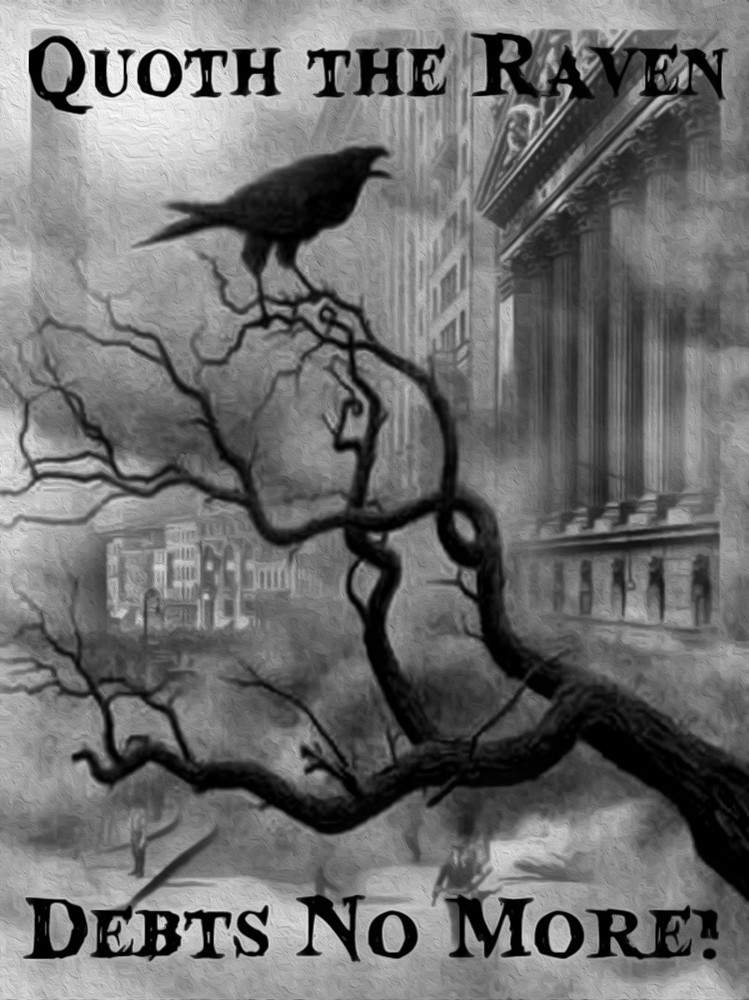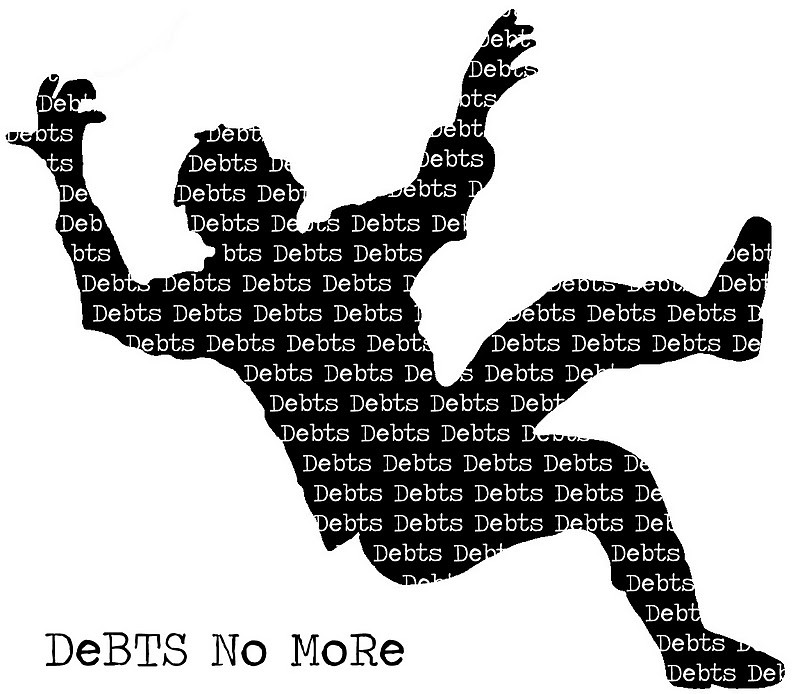
.
THE RAVEN (Debts No More)
(Edgar Allen Poe, The Raven)
WilliamBanzai7
Once upon a midnight dreary, while insolvent weak and weary,
O’r a balance sheet covered in a cloud of debts galore,
While I nodded, nearly napping, suddenly there came a tapping,
As of some one gently rapping, rapping at my chamber door.
`’Tis some visitor,’ I muttered, `tapping at my chamber door –
Only this, and nothing more.’
Ah, distinctly I remember it was bleak as Lehman’s September,
And each despicable creditor wrought its ghost upon the floor.
Eagerly I wished the morrow; – vainly I sought more to borrow
From my books surcease of sorrow – sorrow for the abundant days of yore –
And the rare and hidden debts of toxic bailout whores –
Nameless here for evermore.
And the silken sad uncertain rustling of each indentured debt just
Thrilled me – thrilled me with fantastic plastic Sino-crap never bought before;
So that now, to still the beating of my heart, I stood repeating
‘Tis some banksta entreating entrance at my chamber door –
My late payments entreating his entrance at my chamber door; –
This it is, and nothing more,’
Presently my soul grew stronger; hesitating then no longer,
`Sir,’ said I, `or Madam, truly your debt forgiveness I implore;
But the fact is I was napping, and so gently you came rapping,
And so faintly you came tapping, tapping at my chamber door,
That I scarce was sure I heard you’ – here I opened wide the door; –
Darkness there, and nothing more.
Deep into that darkness peering, long I stood there wondering, fearing,
Doubting, dreaming dreams no debt bloated mortal ever dared to dream before;
But the silence was unbroken, and the darkness gave no token,
And the only word there spoken was the whispered word, `Debts No More!’
This I whispered, and an echo murmured back the word, `Debts No More!’
Merely this and nothing more.
Back into the chamber turning, my bankrupt soul within me burning,
Soon again I heard a tapping somewhat louder than before.
`Surely,’ said I, `surely that is something at my window lattice;
Let me see then, what thereat is, and this mystery explore –
Let my heart be still a moment and this mystery explore; –
‘Tis the wind of regretted debts and nothing more!’
Open here I flung the shutter, when, with many a flirt and flutter,
In there stepped a stately raven of the saintly solvent days of yore.
Not the least obeisance made he; not a minute stopped or stayed he;
But, with mien of lord or lady, perched above my chamber door –
Perched upon a bust of Subprime Croesus just above my chamber door –
Perched, and sat, and nothing more.
Then this ebony bird beguiling my sad fancy into smiling,
By the grave and stern decorum of the counterclaim it wore,
`Though thy crest be shorn and shaven, thou,’ I said, `art sure no Wall Street schemer.
Ghastly grim and ancient raven wandering in my open chamber –
Tell me what unlordly crime now comes from those Wall Street whores!’
Quoth the raven, `Debts No More!’
Much I marvelled this ungainly fowl to hear discourse so plainly,
Though its answer little meaning – little relevancy bore;
For we cannot help agreeing that no insolvent human being
Ever yet was blessed with seeing bird above his chamber door –
Bird or beast above the sculptured bust above his chamber door,
With such name as `Debts No More.’
But the raven, sitting lonely on the placid bust, spoke only,
Those simple words, as if his soul in that one phrase he did outpour.
Nothing further then he uttered – not a feather then he fluttered –
Till I scarcely more than muttered `Other friends have drowned in debt before –
On the morrow he will leave me, as my hopes have flown before.’
Then again the bird said, `Debts No More.’
Startled at the stillness broken by reply so aptly spoken,
`Doubtless,’ said I, `what it utters is its only stock and store,
Caught from some unhappy master whom financial disaster
Followed fast and followed faster till his songs one burden bore –
Till the dirges of his hope that melancholy burden bore
Of “Debts No More.”‘
But the raven still beguiling all my bankrupt soul to smiling,
Straight I wheeled a cushioned seat in front of bird and bust and door;
Then, upon the velvet sinking, I betook myself to linking
Fancy unto fancy, thinking what this ominous bird of yore –
What this grim, ungainly, ghastly, gaunt, and ominous bird of yore
Meant in croaking `Debts No More.’
Thus I sat engaged in guessing, but no syllable expressing
To the fowl whose fiery eyes now burned into my bankrupt core;
This and more I sat divining, with my head at ease reclining
On the cushion’s velvet lining that the lamp-light gloated o’er,
But whose velvet violet lining with the lamp-light gloating o’er,
He shall press, ah, Debts N
o More!
Then, methought, the air grew denser, perfumed from an unseen censer
Swung by the House of Greenspans’s sacred liens whose foot-falls tinkled on the subprime floor.
`Wretch,’ I cried, `thy God hath lent thee – by these angels he has sent thee
Respite – respite and nepenthe from thy proposition of Debts No More!
Quaff, oh quaff this kind nepenthe, and forget this silliness of Debts No More!’
Quoth the raven, `Debts No More.’
`Prophet!’ said I, `thing of evil! – prophet still, if bird or devil! –
Whether tempter sent, or whether tempest tossed thee here ashore,
Desolate yet all undaunted, on this debt spoiled land all fraudclosure haunted –
On this subprime home by horror haunted – tell me truly, I implore –
Is there – is there a cancer in the Bernanks brain? – tell me – tell me, I implore!’
Quoth the raven, `Debts No More.’
`Prophet!’ said I, `thing of evil! – prophet still, if bird or devil!
By that Heaven that bends above us – by that God we both adore –
Tell this lost soul with unpaid debts laden if, within the distant Eden,
It shall clasp a sainted maiden whom the angels named Debts No More –
Clasp a rare and radiant maiden, whom the angels named Debts No More?’
Quoth the raven, `Debts No More.’
`Be that word our sign of parting, bird or fiend!’ I shrieked upstarting –
`Get thee back into the tempest and the usurious shore!
Leave fraudclosure doom as a token of the words thy soul hath spoken!
Leave my credit score unbroken! – quit the bust above my door!
Take thy beak from out my wallet, and take thy form from off my door!’
Quoth the raven, `Debts No More.’
And the raven, never flitting, still is sitting, still is sitting
On the pallid bust of Subprime Croesus just above my chamber door;
And his eyes have all the seeming of a demon’s that is screaming,
And the lamp-light o’er him streaming throws his shadow on the floor;
And my net worth from out that debtless shadow that lies floating on the floor
Shall be lifted, nevermore!
.








via Zero Hedge http://feedproxy.google.com/~r/zerohedge/feed/~3/dGSTjhJKA5g/story01.htm williambanzai7
![]()






